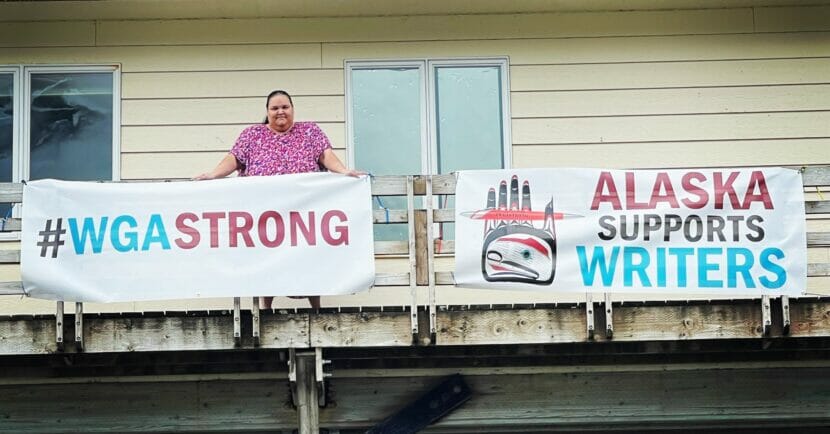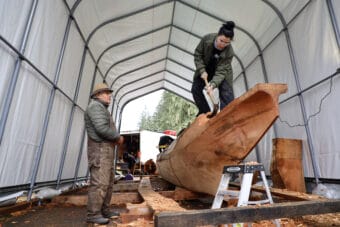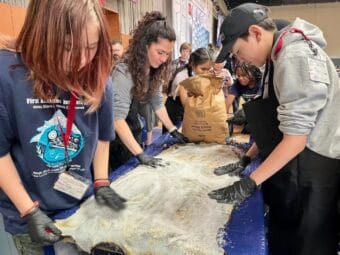
Alaska writer Vera Starbard recently hung banners from the deck of her Douglas home in support of the nationwide writers’ strike.
Starbard, a member of the Writers Guild of America union, has written for the PBS Kids show “Molly of Denali” and the recently canceled ABC drama “Alaska Daily.”
Starbard is Lingít and Athabascan and has also written plays for Perseverance Theatre.
KTOO’s Chloe Pleznac spoke with Starbard about the banners and what she and the writers picketing in Los Angeles and New York City hope to achieve.
This interview has been edited for length and clarity.
Chloe Pleznac: So how long have you been part of the Writers Guild of America union, and do you feel that it’s helped you as a writer?
Vera Starbard: I only was eligible this time last year, and only about seven, eight months ago have been sort of officially a card carrying member of the WGA. And immediately there were benefits — there were things that I never thought I’d get as a writer. Being a freelance creative writer, you just don’t expect to ever get things like retirement funds, health care — these things just aren’t something you expect or plan for, even. As a writer, you kind of have to make do. But with WGA, they require that our employers pay for that, that they kind of make all these benefits that are more typical of office jobs, and we’re allowed them. So already, I mean immediately, I was getting things that I think most, you know, salaried workers or full-time workers sort of expect, but we haven’t been able to expect. So that’s been great.
Chloe Pleznac: You recently posted on social media about two banners you’ve placed on the porch of your Douglas home. One reads “#WGAstrong” and the other “Alaska supports writers.” Why did you decide to put those signs up?
Vera Starbard: Part of it honestly, because I’m watching all my friends, co-workers, colleagues in New York and LA — and even some other locations like New Mexico and Atlanta — picketing. Really sort of literally shutting down productions, which is the fastest way to sort of make the studio’s willing to make any sort of negotiations with us, really. And I was feeling very — like I can’t do my part. I’m up here, there’s no studios or anything shooting up here. But we do have 1.5 million cruise ship passengers passing by my house, which just happens to be on their route into the docks, so let’s let them know. Let’s sort of raise awareness for all these people who are coming up here that – for one, I’ve always found Alaska to be extremely supportive of my writing and other writers and artists in general, and especially Juneau – but also get them aware. Maybe it’s, it’s just cryptic enough on the “WGA strong” that I might look it up and see what that’s all about.
Chloe Pleznac: So what do you hope the strike achieves?
Vera Starbard: Ultimately, all we want is fair pay, fair benefits, and the ability to have a career out of this. Right now, what writers are facing is you might do one show, work for 10 weeks, and that might be your whole career. It’s very, very difficult, in the best of circumstances, to make a living as a TV writer or just a creative writer in general. But what’s happening with the studios right now is they’re shortening the hours, they’re implementing policies and processes that are pushing newer writers out, pushing diverse writers out, to be honest. I don’t believe I would be where I am, if the door hadn’t opened just a little bit wider for me to get in by an awful lot of people who’d come before me sort of opening that door. And what studios are trying to do in not being willing to negotiate on fair pay, is shutting that door right back again. And it makes me pretty worried for the future of Native writers being able to enter the industry at all, much less make a living at it. So yeah, ultimately, fair pay. And just to be able to have a middle class income, as a writer.
Chloe Pleznac: Are you feeling any professional impacts from the strike?
Vera Starbard: Oh, sure. Immediately had to set aside some projects that I’m working on, timestamp them, and I can’t touch them until the studios that I’m in contract with on them will negotiate fairly with us. So immediately, I had to sort of plan for the summer of what I was going to be working on, and that’s done. And that means my main source of income is done, also. So there’s definitely that immediately felt. But it’s also something every single writer who voted for this, which was 98% of us, said, you know, “We would rather strike down and feel that temporary pain of no income so that we can have this career, so we can have a career for the future”.
Chloe Pleznac: So Hollywood can feel very far away from Alaska. But are there ways Alaskans could be affected by the strike that we might not expect?
Vera Starbard: Yeah, I think what viewers will definitely notice, what sort of the most typical consumers — of which I’m one — is, you’ll start to see delays for shows that are coming out. But up here, I think what people will really see is there’s just a loss of authenticity. If you don’t have people who are really from Alaska, who really know what they’re talking about writing on these shows, and there are Alaskans writing on these shows about Alaska. Definitely not all of them. And I think we can all name the ones that clearly have no influence from actual Alaskans. But you know, there are some out there, and they’ll start to see that.
Chloe Pleznac: So do we know how long this strike is going to go on for? Has there been any headway that’s been made? I’m not sure if that’s something you’re privy to or able to disclose, but I’m just curious.
Vera Starbard: The WGA definitely keeps us informed. It’s tens of thousands of writers and only a few are on the negotiating committee, so of course we’re not literally in the room, but they do keep us informed. And unfortunately, what we know is, the studios are still just not even willing to talk. That’s where they’re at. The very, very fair proposals that the writers put out there, they weren’t even willing to discuss and negotiate on them. They just said, “We reject it, we’re not going to talk about it.” So right now, it’s in the studio’s hands — they’re not talking. That means, yeah, it’s probably going to be a long strike. And I think that’s sort of in the expectation, is that it will be. The big thing right now is both the directors’ union, and the actors’ union are up for their contract negotiations as well. So in a matter of weeks and months, there’s going to be some movement from them. And they’ve been extremely supportive of the writers. Really, the whole – sort of everyone below executive level has been very supportive of the writers, because we’re all kind of in the same boat, we’re all getting affected by the same low pay and unfair contracts … I believe it’ll be through at least June and July. But that’s just my personal, my personal guess. And that’s because of what’s about to happen with the directors’ and actors’ unions, that everybody’s been so supportive and ready to sort of join the fight and have been joining the fight. We’ve had so many actors and directors striking and picketing with us. So it’s a good, it’s a good indication of what’s about to happen. But it’s also about to get kind of messy.
Chloe Pleznac: I really appreciate you taking the time to talk with me.
Vera Starbard: Yeah no, gunalchéesh. Thanks for having me.
Vera Starbard is on KTOO’s Board of Directors.


